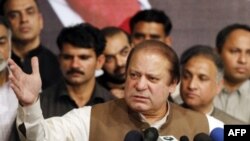ISLAMABAD —
Pakistan’s Nawaz Sharif, who is set to become prime minister for a third time after his party won recent parliamentary elections, on Monday called for peace talks with domestic Taliban extremists, saying “this is the best option” to fight militancy.
Addressing newly elected federal and provincial lawmakers of his Pakistan Muslim League-N (PML-N) party in Lahore, Sharif described terrorism as “the most serious challenge” facing the country.
Without eliminating this “menace” and establishing peace in Pakistan, he added, attempts to revive the national economy and overcome a deepening energy crisis will not succeed.
The presumptive prime minister has in the past favored peace talks between the militants and the government, but Monday’s statement was the first time he has done so publicly since his party scored a resounding victory in May 11 national elections.
Sharif says he has long called for resolving the issue of militancy through peaceful negotiations because using “guns and bullets only” can never be a solution to the problem. The “offer should be taken seriously,” he says, if Taliban militants are ready to engage in a peace dialogue with the government.
He was referring to a recent offer of peace talks by Tehreek-e-Taliban Pakistan or TTP, which is an alliance of Islamist groups waging a bloody insurgency against the Pakistani state.
Sharif says that the bloody war has killed more than 40,000 Pakistanis and caused billions of dollars in losses to the national economy.
He says there is nothing wrong in sitting across the table and engaging in talks with militants. “If it can help bring peace to the country, in my view it is the best option,” the former prime minister added.
Pakistan’s partnership in the U.S.-led counter-terrorism campaign in Afghanistan and military offensive against Taliban bases in the northwestern border regions over the past decade has prompted retaliatory suicide and other terrorist attacks in the country.
Recent media reports quoted a Taliban spokesman as saying they may declare a ceasefire if the Sharif party demonstrated seriousness in holding peace talks.
Critics are skeptical about the success of any future talks between Pakistani authorities and the Taliban. Previous peace deals with the militants, they say, have only allowed the insurgents to regroup.
Sharif is seen as a conservative Muslim and has always enjoyed the support of right-wing forces in the country. His party is expected to form a stable government at the federal level and in two of the country’s four provinces, including Punjab, the power base of Pakistan.
Addressing newly elected federal and provincial lawmakers of his Pakistan Muslim League-N (PML-N) party in Lahore, Sharif described terrorism as “the most serious challenge” facing the country.
Without eliminating this “menace” and establishing peace in Pakistan, he added, attempts to revive the national economy and overcome a deepening energy crisis will not succeed.
The presumptive prime minister has in the past favored peace talks between the militants and the government, but Monday’s statement was the first time he has done so publicly since his party scored a resounding victory in May 11 national elections.
Sharif says he has long called for resolving the issue of militancy through peaceful negotiations because using “guns and bullets only” can never be a solution to the problem. The “offer should be taken seriously,” he says, if Taliban militants are ready to engage in a peace dialogue with the government.
He was referring to a recent offer of peace talks by Tehreek-e-Taliban Pakistan or TTP, which is an alliance of Islamist groups waging a bloody insurgency against the Pakistani state.
Sharif says that the bloody war has killed more than 40,000 Pakistanis and caused billions of dollars in losses to the national economy.
He says there is nothing wrong in sitting across the table and engaging in talks with militants. “If it can help bring peace to the country, in my view it is the best option,” the former prime minister added.
Pakistan’s partnership in the U.S.-led counter-terrorism campaign in Afghanistan and military offensive against Taliban bases in the northwestern border regions over the past decade has prompted retaliatory suicide and other terrorist attacks in the country.
Recent media reports quoted a Taliban spokesman as saying they may declare a ceasefire if the Sharif party demonstrated seriousness in holding peace talks.
Critics are skeptical about the success of any future talks between Pakistani authorities and the Taliban. Previous peace deals with the militants, they say, have only allowed the insurgents to regroup.
Sharif is seen as a conservative Muslim and has always enjoyed the support of right-wing forces in the country. His party is expected to form a stable government at the federal level and in two of the country’s four provinces, including Punjab, the power base of Pakistan.








